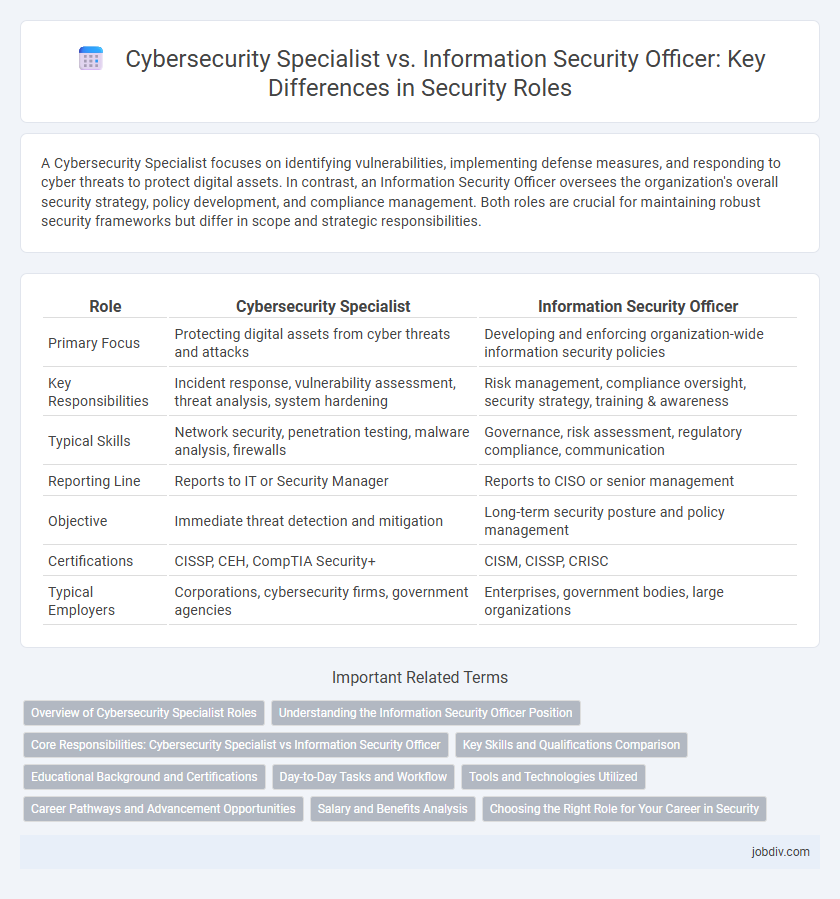A Cybersecurity Specialist focuses on identifying vulnerabilities, implementing defense measures, and responding to cyber threats to protect digital assets. In contrast, an Information Security Officer oversees the organization's overall security strategy, policy development, and compliance management. Both roles are crucial for maintaining robust security frameworks but differ in scope and strategic responsibilities.
Table of Comparison
| Role | Cybersecurity Specialist | Information Security Officer |
|---|---|---|
| Primary Focus | Protecting digital assets from cyber threats and attacks | Developing and enforcing organization-wide information security policies |
| Key Responsibilities | Incident response, vulnerability assessment, threat analysis, system hardening | Risk management, compliance oversight, security strategy, training & awareness |
| Typical Skills | Network security, penetration testing, malware analysis, firewalls | Governance, risk assessment, regulatory compliance, communication |
| Reporting Line | Reports to IT or Security Manager | Reports to CISO or senior management |
| Objective | Immediate threat detection and mitigation | Long-term security posture and policy management |
| Certifications | CISSP, CEH, CompTIA Security+ | CISM, CISSP, CRISC |
| Typical Employers | Corporations, cybersecurity firms, government agencies | Enterprises, government bodies, large organizations |
Overview of Cybersecurity Specialist Roles
Cybersecurity specialists focus on protecting networks, systems, and data from cyber threats by implementing firewalls, intrusion detection systems, and conducting vulnerability assessments. Their responsibilities include monitoring security alerts, responding to incidents, and developing strategies to prevent cyberattacks. These specialists typically possess expertise in threat analysis, penetration testing, and security software management, differentiating their roles from the broader organizational focus of Information Security Officers.
Understanding the Information Security Officer Position
An Information Security Officer (ISO) oversees the development and implementation of comprehensive security policies, ensuring organizational compliance with regulatory standards and mitigating risks at a strategic level. Unlike Cybersecurity Specialists who concentrate on technical defense mechanisms and threat detection, ISOs manage cross-departmental security governance, incident response coordination, and continuous risk assessments. Their role demands expertise in risk management frameworks, regulatory requirements such as GDPR or HIPAA, and aligning security initiatives with business objectives to protect sensitive data assets.
Core Responsibilities: Cybersecurity Specialist vs Information Security Officer
Cybersecurity Specialists focus on implementing and monitoring technical defenses such as firewalls, intrusion detection systems, and vulnerability assessments to protect organizational assets from cyber threats. Information Security Officers are responsible for developing and enforcing comprehensive security policies, risk management strategies, and compliance with regulatory standards across the organization. Both roles collaborate to ensure a robust security posture, with specialists handling operational security tasks and officers overseeing strategic governance.
Key Skills and Qualifications Comparison
Cybersecurity Specialists require expertise in penetration testing, threat analysis, and malware defense, emphasizing hands-on technical skills such as network security protocols and incident response. Information Security Officers focus on strategic risk management, regulatory compliance, and policy development, requiring strong knowledge of frameworks like ISO 27001 and NIST. Both roles benefit from certifications such as CISSP and CISM, but Cybersecurity Specialists prioritize technical certifications like CEH, while Information Security Officers lean towards management-focused credentials.
Educational Background and Certifications
Cybersecurity Specialists typically hold degrees in computer science, information technology, or cybersecurity, with certifications such as Certified Information Systems Security Professional (CISSP), Certified Ethical Hacker (CEH), and CompTIA Security+ enhancing practical expertise. Information Security Officers often possess advanced degrees in cybersecurity, information assurance, or business administration combined with certifications like CISSP, Certified Information Security Manager (CISM), and Certified Information Systems Auditor (CISA) to align technical skills with strategic leadership. Both roles require continual education through professional development and updated certifications to address evolving security threats effectively.
Day-to-Day Tasks and Workflow
Cybersecurity Specialists primarily focus on identifying, analyzing, and mitigating cyber threats through continuous monitoring, vulnerability assessments, and incident response coordination. Information Security Officers oversee the implementation of security policies, compliance with regulations, and strategic risk management across the organization, ensuring alignment with business objectives. Their workflows intersect during security audits and threat mitigation, but Cybersecurity Specialists handle technical defenses while Information Security Officers manage governance and policy enforcement.
Tools and Technologies Utilized
Cybersecurity Specialists primarily utilize advanced threat detection software, intrusion prevention systems, and security information and event management (SIEM) tools to identify and mitigate cyber threats in real time. Information Security Officers focus on governance and compliance technology platforms, risk management frameworks, and data encryption solutions to ensure organizational data privacy and regulatory adherence. Both roles integrate endpoint protection, vulnerability assessment tools, and incident response technologies to maintain comprehensive security postures.
Career Pathways and Advancement Opportunities
Cybersecurity Specialists typically begin their careers with technical roles such as threat analysts or system administrators, advancing by gaining certifications like CISSP or CEH and mastering skills in network defense and incident response. Information Security Officers often progress from managerial positions in IT or cybersecurity teams, focusing on strategic risk management, compliance, and policy development to move into executive roles such as Chief Information Security Officer (CISO). Both career paths offer advancement opportunities, but Cybersecurity Specialists tend to deepen technical expertise while Information Security Officers expand leadership and governance responsibilities.
Salary and Benefits Analysis
Cybersecurity Specialists typically earn an average salary ranging from $85,000 to $120,000 per year, reflecting their technical expertise in threat detection and mitigation. Information Security Officers often command higher compensation, averaging between $110,000 and $150,000 annually, due to their strategic role in governance, risk management, and compliance oversight. Benefits for both roles include health insurance, retirement plans, and professional development opportunities, with Information Security Officers more likely to receive executive perks such as performance bonuses and stock options.
Choosing the Right Role for Your Career in Security
Choosing between a Cybersecurity Specialist and an Information Security Officer depends on your career goals and expertise in security domains. Cybersecurity Specialists focus on hands-on technical defense, threat detection, and vulnerability management, while Information Security Officers oversee comprehensive security policies, risk management, and compliance across organizations. Prioritizing the right role involves assessing your strengths in tactical security operations versus strategic governance and risk oversight in IT security frameworks.
Cybersecurity Specialist vs Information Security Officer Infographic

 jobdiv.com
jobdiv.com